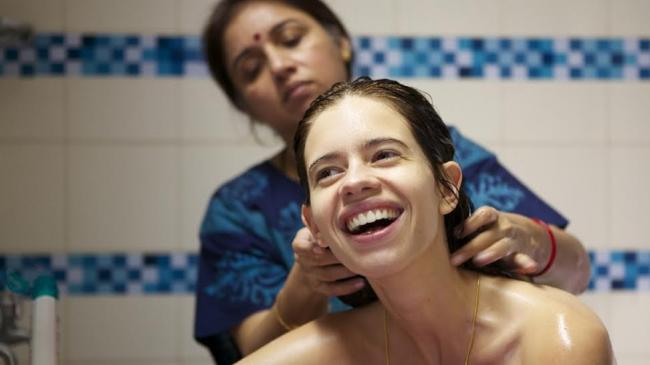April 25, 2024 22:56 (IST)

Loving life
The buzz around the film Margarita with a Straw on a disabled teenager's jest for life and desire also brings into focus the less talked about subject of sexuality relating to the differently able people, writes Ranjita Biswas
Do the disabled have the same desire of the body? Do they crave the physical intimacy like the so-called ‘normal’ people? This is something seldom discussed in our society, or even mentioned. Lately, there has been quite a buzz around the newly released film Margarita with a Straw because among other issues this aspect has been dealt with too, a breakthrough of sorts. Kalki Koechlin as protagonist Laila, afflicted with cerebral palsy which makes body movement and speech extremely difficult, makes it amply clear that she has the normal desire of the body like any other young woman.
When asked about the unusual title in an interview, director Shonali Bose said that the film is inspired by Malini, her cousin and friend. She shared that when they went out together she always asked for a straw for Malini so that she could enjoy the whiskey better. Hence the name. For Bose, the film is not a ‘pitying’ look at disability, but a triumph of will power and also an attempt at nudging people to think of ‘those people’ in a new light.
Bose’s inspiration, Malini Chib, has penned a no holds barred autobiography One Little Finger where she writes frankly, “I [often] wondered if there would ever be a man in my life. Would a man see beyond my body? Would I ever be needed by a man emotionally or would I always be regarded as a burden for someone to take care of?”
Malini uses a communicator or voice-box much like the one physicist Stephen Hawkins does. She types using one finger, a long process that needs patience and determination.
Kolkata-based Jeeja Ghosh, Head, Advocacy at Indian Institute of Cerebral Palsy who made headlines in 2012 after she took SpiceJet airline to court for offloading her on the ground of her disability, is now happily married with a man as the couple appeared on a TV show recently on the film to share their love story and chemistry.
In one of her Facebook notes titled Touch, she writes how her last wish is to “to feel the warmth of your touch, and to know you still love me.”
A professional social worker (MSW) from Delhi University who got a master degree in Disability Studies from Leeds University, Ghosh’s special area of interest is women with disabilities.
(MSW) from Delhi University who got a master degree in Disability Studies from Leeds University, Ghosh’s special area of interest is women with disabilities.
 (MSW) from Delhi University who got a master degree in Disability Studies from Leeds University, Ghosh’s special area of interest is women with disabilities.
(MSW) from Delhi University who got a master degree in Disability Studies from Leeds University, Ghosh’s special area of interest is women with disabilities. Koechlin admits that enacting intimate scenes in the film, with a woman here, was a bit difficult but then she accepted that it’s about “a teenager, her desires and her sexual preferences. We need to understand that everyone has his or her sexual preferences.”
The off-track subject of the film opens up an area seldom figuring on screen, even in Hollywood, let alone back home, though there have been films on disability and individuals winning against odds. The fact remains that disabled women and sexuality are often thought to be an oxymoron, as if desire, which, psychologists often point out is embedded in the mind, leaves the body when the limbs refuse to act as ‘normal.’
When Malini was in Kolkata at the launch of her book sometime ago, she had said, “People think of us as ‘asexual.’ As if we ‘cannot’ or do not have these feelings, something any so-called normal woman can have.”
sometime ago, she had said, “People think of us as ‘asexual.’ As if we ‘cannot’ or do not have these feelings, something any so-called normal woman can have.”
 sometime ago, she had said, “People think of us as ‘asexual.’ As if we ‘cannot’ or do not have these feelings, something any so-called normal woman can have.”
sometime ago, she had said, “People think of us as ‘asexual.’ As if we ‘cannot’ or do not have these feelings, something any so-called normal woman can have.” The subject has been taken up in rare films like Rust and Bone, where Marion Cotillard 's character accepts the inevitable that no man would want her sexually after she loses both her legs in an accident. But then she meets and connects with an Alpha male played by Matthias Schoenaerts who treats her like any other woman.
In the Australian film Dance Me to My Song (1998) where protagonist Julia, confined to a wheelchair suffering from cerebral palsy, falls in love with her neighbour, compassionate Eddie, reflects the mental dilemma, and longing for love and sex, in a beautiful way. In fact, the star of the film who also co-wrote the script, Heather Rose is afflicted with cerebral palsy herself and shows deep understanding of the character, though she says the film is not autobiographical.
“As often as not, women with a disability other than brain damage have intact biological sexual drive,” writes Rosemary Basson, department of psychiatry and of obstetrics and gynaecology, University of British Columbia, Vancouver in her research paper “Sexual health of women with disabilities. She adds that, “She remains a sexual person with the potential to have sexual experiences and to build relationships.”
of psychiatry and of obstetrics and gynaecology, University of British Columbia, Vancouver in her research paper “Sexual health of women with disabilities. She adds that, “She remains a sexual person with the potential to have sexual experiences and to build relationships.”
 of psychiatry and of obstetrics and gynaecology, University of British Columbia, Vancouver in her research paper “Sexual health of women with disabilities. She adds that, “She remains a sexual person with the potential to have sexual experiences and to build relationships.”
of psychiatry and of obstetrics and gynaecology, University of British Columbia, Vancouver in her research paper “Sexual health of women with disabilities. She adds that, “She remains a sexual person with the potential to have sexual experiences and to build relationships.” In the Indian context, says Anita Ghai of Delhi, teacher and disability rights activist, “In our society sexuality, especially of women, is tied up with marriage. Physical disability is seen as a major hindrance though disabled persons do get married occasionally. However, meeting people, socially interact with the opposite sex are major hindrances.”
In her book (Dis)Embodied Form : Issues of Disabled Women (2003), Ghai talks about many of these issues.
: Issues of Disabled Women (2003), Ghai talks about many of these issues.
 : Issues of Disabled Women (2003), Ghai talks about many of these issues.
: Issues of Disabled Women (2003), Ghai talks about many of these issues. TARSHI, a Delhi-based NGO that specialises on issues of sexuality and body images in society, in its report Sexuality and Disability in the Indian Context (2010) points out: “The reality is that women with disabilities are sexual beings with sexual fantasies, feelings and aspirations like anyone else. They are unable to express their sexuality fully not so much because of a disability but because of the assumption that they are not sexual.”
This attitude is not confined to the so-called layman. It can extend to professionals in the medical field as well. Ghai recalls an incident when she wanted to have a Pap Smear test done which mid-life women, particularly menopausal women, are advised to take to detect cancerous and pre-cancerous cell changes in the cervix. The request flummoxed the gynaecologist and she asked, ‘But why do you need it?’
Due to our patriarchal mindset, and men are not necessarily the only flag-bearers, the problem is more, Ghai feels .
.
 .
. However, a positive trend observed today is that people are at least talking about these issues whether getting exposure through books like Malini Chib’s, the visual media or awareness creation efforts by activists. That a film like Margarita with a Straw is made today for general screening and not confined to a niche audience, is indeed a sign of maturity and change.
like Malini Chib’s, the visual media or awareness creation efforts by activists. That a film like Margarita with a Straw is made today for general screening and not confined to a niche audience, is indeed a sign of maturity and change.
 like Malini Chib’s, the visual media or awareness creation efforts by activists. That a film like Margarita with a Straw is made today for general screening and not confined to a niche audience, is indeed a sign of maturity and change.
like Malini Chib’s, the visual media or awareness creation efforts by activists. That a film like Margarita with a Straw is made today for general screening and not confined to a niche audience, is indeed a sign of maturity and change.
Support Our Journalism
We cannot do without you.. your contribution supports unbiased journalism
IBNS is not driven by any ism- not wokeism, not racism, not skewed secularism, not hyper right-wing or left liberal ideals, nor by any hardline religious beliefs or hyper nationalism. We want to serve you good old objective news, as they are. We do not judge or preach. We let people decide for themselves. We only try to present factual and well-sourced news.
Support objective journalism for a small contribution.
Latest Headlines
Mimi Chakraborty unveils Joy Personal Care's 4D anamorphic display 'JOY KKR 4D Fan-tasy' in Kolkata Mon, Apr 22 2024
The Kerala Story famed actress Adah Sharma launches Limelight Diamonds' store in Kolkata Mon, Apr 22 2024
Tinder now allows users to share information about date plans with friends and loved ones Mon, Apr 22 2024
Vattikuti Foundation announces KS International Innovation Awards for Robotic Surgery Mon, Apr 22 2024
WhatsApp to allow users rejigging their favourite contact list Mon, Apr 22 2024
Mona Lisa is rapping in a new viral video, check out how Microsoft made it possible with AI Sun, Apr 21 2024
Sonata unveils Spring and Summer 2024 collection with Poze Fri, Apr 19 2024







